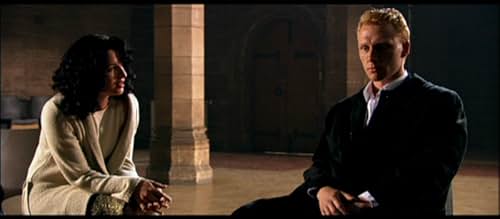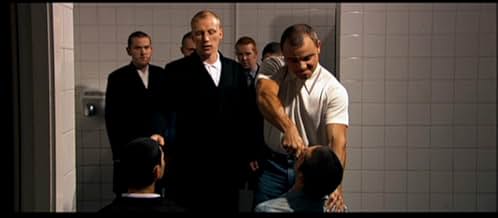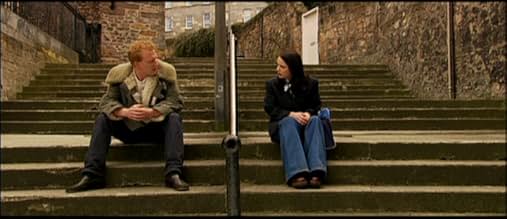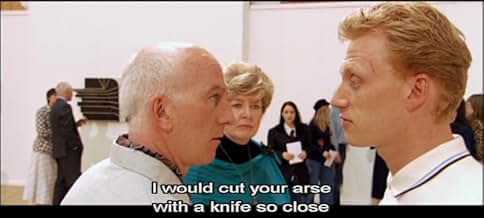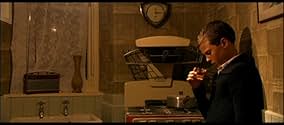IMDb RATING
6.2/10
1.8K
YOUR RATING
16 years of alcohol is about a skinhead named Frankie; his violent childhood, alcoholism and his love for Ska.16 years of alcohol is about a skinhead named Frankie; his violent childhood, alcoholism and his love for Ska.16 years of alcohol is about a skinhead named Frankie; his violent childhood, alcoholism and his love for Ska.
- Awards
- 4 wins & 9 nominations total
Iain De Caestecker
- Frankie - Boy
- (as Iain De Caestaecker)
Lewis Macleod
- Frankie's Father
- (as Lewis MacLeod)
Noof Ousellam
- Rival Gang Boy 1
- (as Naoufal Ousellam)
- Director
- Writer
- All cast & crew
- Production, box office & more at IMDbPro
6.21.7K
1
2
3
4
5
6
7
8
9
10
Featured reviews
Give the guy a break, it was quite good
I'm not a huge film buff but I went to see a screening of this film at the GFT in Glasgow on Monday and Richard Jobson was giving a Q & A afterwards.
Thought his answers to the audience were good and definitely helped make sense of the film a bit much. He made some really good points about the types of films coming out of Scotland these days and how he was trying to get away from that drab reality style we're used to seeing.
it's worth seeing anyway, I wouldn't write it off straight away.
Thought his answers to the audience were good and definitely helped make sense of the film a bit much. He made some really good points about the types of films coming out of Scotland these days and how he was trying to get away from that drab reality style we're used to seeing.
it's worth seeing anyway, I wouldn't write it off straight away.
Arguably, a bit better than Hallmark
Films about alcohol are usually depressing. They rob all the enthusiasm for life one might have in just a few hours and leave you staring into the void at the end, wondering what the point was. It's difficult to catalog them in any way, because a good "alcoholics movie" is one which swiftly flows along certain psychological retinues and steadily builds up to a mammoth of self deprivation.
However, this isn't truly a film about alcohol. It's more a film about getting a life (yes, Trainspotting), portrayed in a less imaginative way. It all gravitates around love and the end is helplessly tragic, but "Sixteen Years of Alcohol" isn't that bad. Some sweet imagery and photography might make it worth your time. Also, the story resides within the soul of everyone who suffers due to lack of purpose, not only those subdued to the magic liquor. It's a borderline movie: you may very well dislike it, because the storyline is crap. Like all those films which fit into this part of the movie-specter, "Sixteen..." has good and bad parts. Just to name one, I want to recall the "Clockwork Orange" scenes, which are a homage-like rip-off, that barely prove a point. Moreover, those scenes feel terribly frustrating.
All in all, it's not too bad and it could hardly have been better. No one need to watch it, but everyone is invited. Check out the party. 6/10
However, this isn't truly a film about alcohol. It's more a film about getting a life (yes, Trainspotting), portrayed in a less imaginative way. It all gravitates around love and the end is helplessly tragic, but "Sixteen Years of Alcohol" isn't that bad. Some sweet imagery and photography might make it worth your time. Also, the story resides within the soul of everyone who suffers due to lack of purpose, not only those subdued to the magic liquor. It's a borderline movie: you may very well dislike it, because the storyline is crap. Like all those films which fit into this part of the movie-specter, "Sixteen..." has good and bad parts. Just to name one, I want to recall the "Clockwork Orange" scenes, which are a homage-like rip-off, that barely prove a point. Moreover, those scenes feel terribly frustrating.
All in all, it's not too bad and it could hardly have been better. No one need to watch it, but everyone is invited. Check out the party. 6/10
Pretensions without solid ground
One can't say that Scottish films about the 70s come to often, but this is one time too many. Kevin McKidd does the Edinburghian skinhead, who can't fight his past (or maybe that is what he actually does, beating people up). The past is a father who cheats on his mother and the son who never really get involved, never takes part in anything.
He is somewhat rehabilitated, or is he really? There is an intellectual narrator voice here in contrast to the violent acting of McKidd. Everything becomes too obvious, but that doesn't make things easier to understand.
A failure and only halfway interesting.
He is somewhat rehabilitated, or is he really? There is an intellectual narrator voice here in contrast to the violent acting of McKidd. Everything becomes too obvious, but that doesn't make things easier to understand.
A failure and only halfway interesting.
arty attempt at the 'rehabilitated alcoholic' story
This is on one level a very gritty story of alcohol abuse and violence; on another it is an aesthetically realised elegy to hope and hopelessness. The beautiful images of historic Edinburgh are used unpretentiously as a backdrop to mindlessly savage beatings and physical intimidation, cinematic techniques involving varied use of lighting, colour, slow motion and overt symbolism. In one scene, the dead-end nature of the lives of people in a bar is demonstrated by showing them as corpses, seated with their drinks and covered in cobwebs, as the main protagonist looks on and questions his own downward-spiralling life of drink and vengeance. There is some light in the character of Helen, an art school graduate whose love might inspire hoodlum Frankie to give up his drunken brawling loud-mouthed ways, but ultimately the story of the slow and painful attempts of an alcoholic to reform himself will be too easily forgotten. The artistic attempts of writer/director and former Skids band-member Richard Jobson are what make the biggest impression it remains to be seen whether Jobson can subsequently produce of work of creative genius rather than something that simply suggests considerable talent.
Sparse and Barren!
This is a strange morose film. At times it felt like a full length student movie with little in the way of plot development but some interesting themes. It had some interesting points to make on alcoholism but was more a study of the drinking culture of the Scottish working class. The film was held together well by Andewr McKidd who occupies most scenes with some good supporting cast and a cameo from director Richard Jobson. A satisfying film though I am not sure I would want to watch it again. Judge for yourself is my strongest recommendation. All in all this is a good but not great film. Some of what saves the movie are the interesting camera shots and a great soundtrack that I will now definitely be seeking out.
Did you know
- ConnectionsReferences Enter the Dragon (1973)
- How long is 16 Years of Alcohol?Powered by Alexa
Details
- Release date
- Country of origin
- Language
- Also known as
- Frankie Mac - huliganen
- Filming locations
- Production company
- See more company credits at IMDbPro
Box office
- Gross US & Canada
- $8,046
- Opening weekend US & Canada
- $2,863
- Mar 20, 2005
- Gross worldwide
- $8,046
- Runtime
- 1h 42m(102 min)
- Color
- Sound mix
- Aspect ratio
- 2.35 : 1
Contribute to this page
Suggest an edit or add missing content



